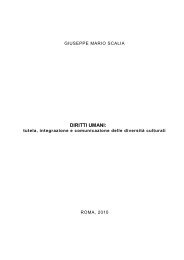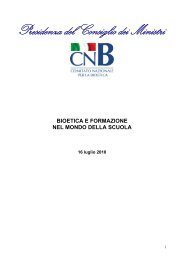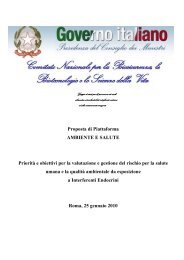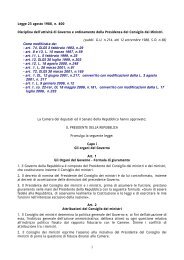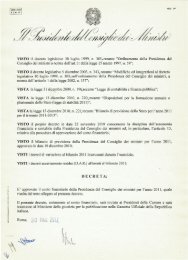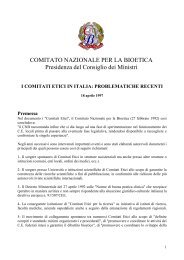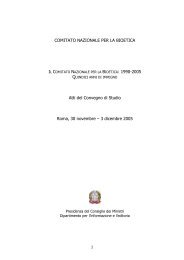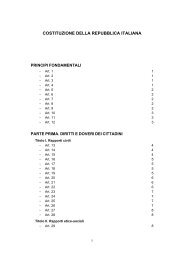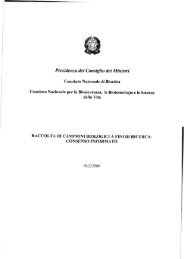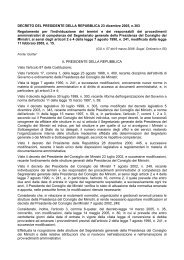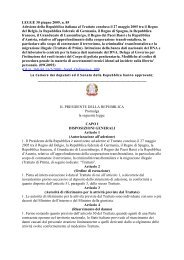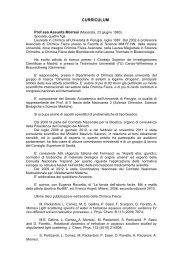- Page 2 and 3:
PRESIDENT Prof. Francesco Paolo Cas
- Page 4 and 5:
Prof. Alberto Piazza Full Professor
- Page 6 and 7:
PRESENTATION The National Bioethics
- Page 8 and 9:
a _________________________ DEMONST
- Page 10 and 11:
confidence intervals. At times the
- Page 12 and 13:
functioning of ethical Committees,
- Page 14 and 15:
Introduction The National Bioethics
- Page 16 and 17:
Document 1. Interspecies living bei
- Page 18 and 19:
denucleated cytoplasm of animal spe
- Page 20 and 21:
weeks old, into sheep foetuses. A f
- Page 22 and 23:
transferring the nucleus, inserting
- Page 24 and 25:
Some NBC members 35 observe that th
- Page 26 and 27:
3.1 The state of the art Only one s
- Page 28 and 29:
I. The ethical value of the experim
- Page 30 and 31:
intentionally produced for experime
- Page 32 and 33:
Constitution that, like the German
- Page 34 and 35:
of identifying the biochemical dete
- Page 36 and 37:
) any other process that starts the
- Page 38 and 39:
As for the letter b), we observe th
- Page 40 and 41:
Other NBC members 73 instead have r
- Page 42 and 43:
present a differentiated panorama.
- Page 44 and 45:
Biomedicine, issued in Oviedo on th
- Page 46 and 47:
with regards to its practical appli
- Page 48 and 49:
PERSONAL REMARKS Supplementary pers
- Page 50 and 51:
Only one published scientific paper
- Page 52 and 53:
Why? Perhaps you have information w
- Page 54 and 55:
intervention on the object, but is
- Page 56 and 57:
INTRODUCTION The opinion analyses m
- Page 58 and 59:
animals used for experimental or ot
- Page 60 and 61:
alternative based on the 3Rs model
- Page 62 and 63: appropriate application of the 3Rs
- Page 64 and 65: Committees (named in a variety of w
- Page 66 and 67: elaborating the data received highl
- Page 68 and 69: Synthesis and recommendations In li
- Page 70 and 71: Howard B., Hudson M., Preziosi R.,
- Page 72 and 73: Appendix The working Group sent a q
- Page 74 and 75: FACULTY CITY answer question 1 Facu
- Page 76 and 77: natural sciences rarely Faculty of
- Page 78 and 79: Faculty of veterinary medicine 3502
- Page 80 and 81: Effectively, this document could ha
- Page 82 and 83: PRESENTATION…………………
- Page 84 and 85: 25 th February 2010 in unanimity of
- Page 86 and 87: Multiple factors contribute to sexu
- Page 88 and 89: complement XY a female phenotype, w
- Page 90 and 91: labia. Menarche does not occur, the
- Page 92 and 93: made to subjective perception 116 .
- Page 94 and 95: e re-masculinized) has highlighted
- Page 96 and 97: this sense the guidelines focusing
- Page 98 and 99: even if the boy or girl is at the s
- Page 100 and 101: male or female, with great attentio
- Page 102 and 103: necessary psychological support - t
- Page 104 and 105: Introduction The Opinion tackles th
- Page 106 and 107: 1. Outline of sport ethics 1.1 The
- Page 108 and 109: values inherent to fair play agains
- Page 110 and 111: development of sport, even when not
- Page 114 and 115: Much more dramatic the size of the
- Page 116 and 117: in which we must put the phenomenon
- Page 118 and 119: started to turn to in order to achi
- Page 120 and 121: would therefore be better to libera
- Page 122 and 123: towards the use of doping substance
- Page 124 and 125: Presidenza del Consiglio dei Minist
- Page 126 and 127: Prof. Demetrio Neri, Prof. Andrea N
- Page 128 and 129: lood relatives mentioned in the pre
- Page 130 and 131: is not forbidden and it is not expl
- Page 132 and 133: groups, recall common principles, s
- Page 134 and 135: Bibliography As well as the bibliog
- Page 136 and 137: PERSONAL REMARKS Personal remark si
- Page 138 and 139: would not betray the principle of
- Page 140 and 141: undergo a social positive verificat
- Page 142 and 143: from the potential recipient, there
- Page 144 and 145: The Undersecretary of State To the
- Page 146 and 147: INTRODUCTION The document tackles t
- Page 148 and 149: exclusively by the pharmaceutical i
- Page 150 and 151: possible advantages would affect th
- Page 152 and 153: Bibliography 1. European Commission
- Page 154 and 155: INTRODUCTION The opinion Criteria f
- Page 156 and 157: CRITERIA FOR ASCERTAINING DEATH 1.
- Page 158 and 159: more in depth scientific and ethica
- Page 160 and 161: standards”. Therefore, the Commis
- Page 162 and 163:
system and the gaseous exchange in
- Page 164 and 165:
individual’s death. The Author be
- Page 166 and 167:
- giving greater importance to thos
- Page 168 and 169:
of death, seen as life does not res
- Page 170 and 171:
“disintegration” of the organis
- Page 172 and 173:
living, cease. The condition of lif
- Page 174 and 175:
endocranial blood flow in both the
- Page 176 and 177:
cardiac arrest follows their brain
- Page 178 and 179:
United Kindgom, the “non-heart-be
- Page 180 and 181:
cardiac arrests, due to causes that
- Page 182 and 183:
- believes that - in the current st
- Page 184 and 185:
= Whole brain death: state of total
- Page 186 and 187:
document by the NTC, signed by two
- Page 188 and 189:
Presidenza del Consiglio dei Minist
- Page 190 and 191:
Lorenzo d’Avack, Riccardo Di Segn
- Page 192 and 193:
treatment, even in the awareness th
- Page 194 and 195:
person to a simple means, ‘morti
- Page 196 and 197:
attention was paid to suicide, almo
- Page 198 and 199:
in the worst conditions in that con
- Page 200 and 201:
the act is presented to others, in
- Page 202 and 203:
the relationship between adverse fa
- Page 204 and 205:
security measures, with a reduction
- Page 206 and 207:
Lastly, useful initiatives set up i
- Page 208 and 209:
is recommended according to the gui
- Page 210 and 211:
Declaration of the National Bioethi
- Page 212 and 213:
INTRODUCTION The document tackles s
- Page 214 and 215:
PREMISE From 2007, which was declar
- Page 216 and 217:
y the abovementioned authors, which
- Page 218 and 219:
various situations we perceive or t
- Page 220 and 221:
appearance, the signs of aging, whi
- Page 222 and 223:
problems of the female population a
- Page 224 and 225:
free time is very low; this is due
- Page 226 and 227:
The increase in life expectancy has
- Page 228 and 229:
prevention”, as a strategic perio
- Page 230 and 231:
policies that are specifically aime
- Page 232 and 233:
1. “ensuring continuity of care t
- Page 234 and 235:
BIBLIOGRAPHICAL REFERENCES ACOG, Cl
- Page 236 and 237:
Sen A., Development as freedom,1999
- Page 238 and 239:
ATTACHMENT I The incidence of patho
- Page 240 and 241:
age, is instead a serious psychiatr
- Page 242 and 243:
cholesterol (the most harmful) incr
- Page 244 and 245:
that concerning tumours in general,
- Page 246 and 247:
There are many projects of a preven
- Page 248 and 249:
ATTACHMENT III Some statistical dat
- Page 250 and 251:
Table 3 - Women of 65 years and ove
- Page 252 and 253:
Table 5 - Recourse to healthcare se
- Page 254 and 255:
Table 7 - Sport practices of the po
- Page 256 and 257:
Table 9 - Disable people who are 65
- Page 258 and 259:
Table 11 - Net individual income fr
- Page 260 and 261:
Table 13 - Hope of life for those w
- Page 262 and 263:
PRESENTATION The document examines
- Page 264 and 265:
Bioethics and education in schools
- Page 266 and 267:
In particular the Universal Declara
- Page 268 and 269:
- social: the promotion of social d
- Page 270 and 271:
In December 2007, the International
- Page 272 and 273:
education in bioethics, the open qu
- Page 274 and 275:
system in a fairly structured way t
- Page 276 and 277:
namely, the need to find innovative
- Page 278 and 279:
In fact, the two theses do not excl
- Page 280 and 281:
the thesis developed by Hans Jonas
- Page 282 and 283:
The resumption of cooperation betwe
- Page 284 and 285:
stimulus 372 , as it shows, despite
- Page 286 and 287:
faculties 375 and humanities facult
- Page 288 and 289:
The training of teachers is a probl
- Page 290 and 291:
considered on a par with philosophi
- Page 292 and 293:
importance to the rational aspect o
- Page 294 and 295:
point and point of synthesis for sc
- Page 296 and 297:
Presidenza del Consiglio dei Minist
- Page 298 and 299:
DOCUMENT Placebo (from the Latin
- Page 300 and 301:
was not admissible when for example
- Page 302 and 303:
Bibliography 1. WORLD MEDICAL ASSOC
- Page 304 and 305:
23. COMMITTEE FOR MEDICINAL PRODUCT
- Page 306 and 307:
PRESENTATION The document addresses
- Page 308 and 309:
access to restricted areas and effi
- Page 310 and 311:
subject does not have to deposit th
- Page 312 and 313:
possibility of wrongly denied acces
- Page 314 and 315:
corrected. Compliance with these ru
- Page 316 and 317:
safeguards and control by means of
- Page 318 and 319:
3.2.3 Voluntary permanent changes T
- Page 320 and 321:
the most delicate aspects is also r
- Page 322 and 323:
conservation and organization of tr
- Page 324 and 325:
In the light of possible inappropri
- Page 326 and 327:
PRESENTATION The advancement of neu
- Page 328 and 329:
neurosurgical operations and the an
- Page 330 and 331:
causes, i.e. causes of various kind
- Page 332 and 333:
as the obvious fears of abandonment
- Page 334 and 335:
and the issues raised by the new de



